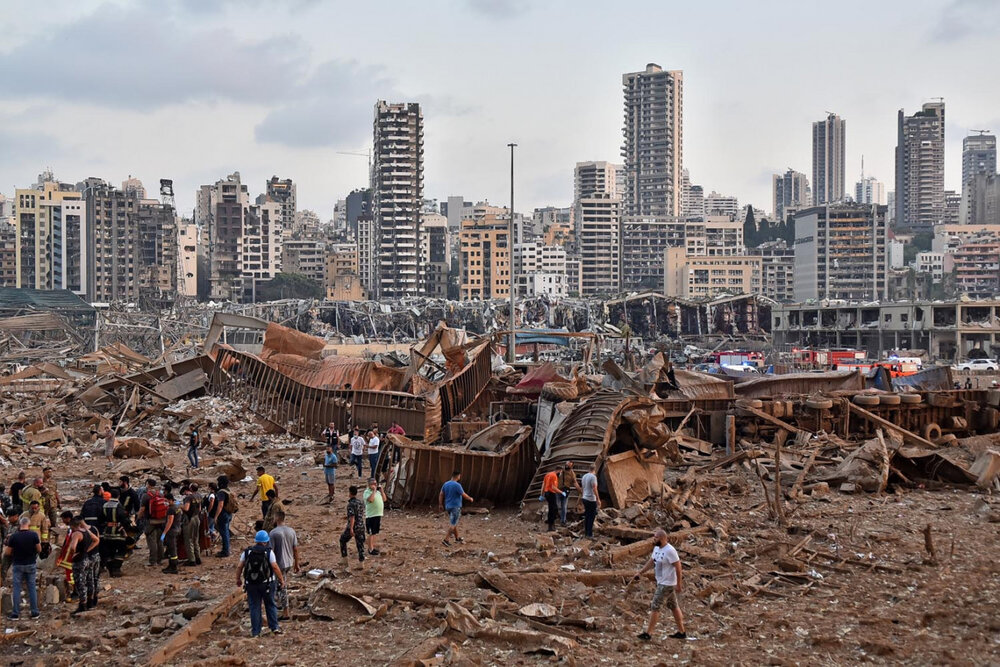Inside the efforts to exploit Beirut tragedy

TEHRAN- While Hezbollah and its allies in the Lebanese government are badly affected by the Beirut massive explosion, some Saudi- and U.S.-affiliated media outlets spread rumors about Hezbollah’s alleged role in the explosion. An analyst tells the Tehran Times that Saudi Arabia is exploiting the deadly blast to mobilize the public against Hezbollah.
On Tuesday, the Lebanese capital city of Beirut was massively rocked by a blast that killed more than 100 and injured thousands of people. The blast was so powerful that it was felt in countries as far as Jordan and Cyprus.
“Today is a deeply sad and painful day… Beirut is grief-stricken… Lebanon is facing a disaster,” Lebanese Prime Minister Hassan Diab said shortly after the Tuesday blast left much of Beirut under debris.
“This is a great national disaster. The images and videos we see truly express this tragedy and translate the scope of the calamity that has affected Lebanon. Beirut is grieving… All of Lebanon is disaster-torn. Lebanon is going through a quite ordeal that could only be faced with national unity and solidarity among all Lebanese from all backgrounds and regions. We are going through a disaster that could only be overcome with determination and tenacity to face this serious challenge and its destructive consequences,” the prime minister noted, adding that those responsible for the blast will be held accountable.
A diplomatic source familiar with the situation in Lebanon told the Tehran Times that the blast is “highly likely” to be an orchestrated sabotage.
Lebanese President Michel Aoun has said that the blast was caused by explosive materials stored in a warehouse at the Beirut port.
“It is unacceptable that a shipment of 2,750 tons of ammonium nitrate has been present for six years in a warehouse, without taking preventive measures,” the president noted.
The source told the Tehran Times that the shipment contained highly explosive materials that were imported from an Eastern European country six years ago and it was supposed to be delivered to militants in Syria.
“Lebanon’s prime minister, president, and the cabinet ministers didn’t know that such a shipment is stored in a warehouse at the port,” the source said, adding that financial issues between the buyer and seller of the shipment have prevented its delivery to the Syrian militants.
If true, this information stands in stark contrast to what the Saudi and American media outlets say about the alleged role of Hezbollah in the blast. The Saudi media has managed to blame the explosion on Hezbollah. For example, al-Hadath TV, a Saudi news network, immediately broadcasted footages from the site of the blast suggesting that it was a result of a missile hitting the port. The network also hosted analysts who laid the blame for the explosion on Hezbollah. The analysts claimed that Hezbollah was to blame for the blast because even if it wasn’t an attack, Hezbollah would be responsible for “storing arms” at the port.
However, independent analysts believe that Hezbollah and its allies in the Hassan Diab government were the parties most affected by the destruction of the Beirut port because Lebanon has already been reeling from a devastating financial and economic crisis and the Beirut port blast will only make the economic situation worse.
About 70% of Lebanon’s imported goods were entering the country through the Beirut port, which includes wheat silos and a free zone with an area of 81,000 square meters. But the ports are now totally destroyed. Therefore, the Diab cabinet, which is backed by Hezbollah, will face difficulties providing citizens with basic goods like wheat and medicines.
Some analysts believe that the Saudis may have some role in the blast because the Beirut port is basically managed by their ally, al-Mostaqbal bloc.
“Evidence shows that the Saudis may have a role in the blast,” Amir Mousavi, a former Iranian diplomat, who served as Iranian cultural attaché in Algeria in 2015, told the Tehran Times. He said that the Lebanese authorities’ investigation into the blast could hurt the Saudis and their allies in Lebanon.
According to Mousavi, officials at the Beirut port are closely allied to the al-Mostaqbal bloc and its Saudi-backed leader, Saad al-Hariri. Mousavi confirmed that senior Lebanese officials were unaware of the existence of the explosive materials at the port.
“The al-Mostaqbal-backed officials at the Beirut port didn’t inform the government or other high-ranking Lebanese officials that there were highly explosive materials stored in a warehouse at the port,” said Mousavi, who is now the director of the Tehran-based Center for Strategic Studies and International Relations.
He also said that the Diab government inherited the current economic woes from al-Hariri, who left the power in late October 2019 amid nationwide protests in the country.
“Diab inherited the government from al-Hariri with an empty treasury. During the last days of al-Hariri’s premiership, his allies took out about $20 billion from Lebanon, a move that exacerbated Lebanon’s hard currency crisis,” Mousavi pointed out.
The former diplomat went on to say that unlike Saudi Arabia, which sought to exploit the Beirut blast to sow discord among the Lebanese and mobilize them against Hezbollah, Iran rushed to help Lebanon immediately after the Tuesday blast, sending three planes with medical aid to Lebanon including a field hospital.
On Tuesday and Wednesday, Iranian Foreign Minister Mohammad Javad Zarif expressed solidarity with Lebanon.
“Our thoughts and prayers are with the great and resilient people of Lebanon. As always, Iran is fully prepared to render assistance in any way necessary. Stay strong, Lebanon,” Iran’s chief diplomat tweeted on Tuesday. He also held a phone conversation with his Lebanese counterpart.
In a tweet on Wednesday, Zarif said he “reiterated Iran's strong and steadfast solidarity with people of Lebanon in call with FM [Charbel] Wehbeh.” Zarif added, “Iran is sending field hospital and medicine to assist with disaster relief. Iran stands with Lebanon.”
